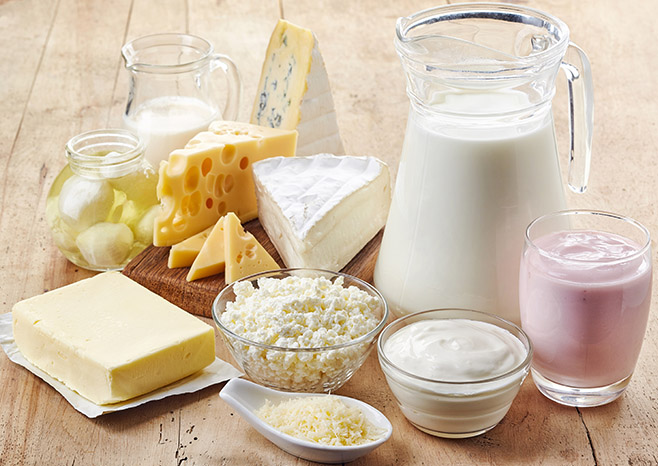
A Deep Dive into Dairy
Dairy products get a mixed rap—one day they’re good for you, the next day they’re not. For many of us, milk, cheese, yogurt and ice cream are staples (or luxuries!) that we’d hate to give up. The good news is that we don’t have to. The consensus among medical professionals is that within certain parameters, the overall benefits of consuming dairy outweigh the negative effects. Let’s look at the pros and cons.
Pros
There is no denying that milk is extremely nutritious. One cup of whole cow’s milk contains just about every nutrient your body needs, including:
• Vitamin B12
• Riboflavin
• Phosphorous
• Vitamin D
• Potassium
• Vitamin A
• Selenium
• Zinc
• Magnesium
• Calcium
• Fat
• Protein
• Carbs
• Sugar
Now, some of those things, like fat, carbs and sugar, are bad in large quantities. But, as with everything else, portion control matters. At 146 calories, the nutritional load makes a cup of milk an excellent liquid super vitamin. What the cow is fed matters, too. A grass-fed cow will produce more omega-3 fatty acids -nutrients essential for brain and eye health – than grain-fed cows. It’s also more expensive, as are organic varieties, which are higher in omega-3s and have a longer shelf life than conventional milk due to hotter sterilization temperatures.
What About Lactose?
According to the National Institutes of Health, 65% of the world population has a reduced ability to digest lactose after infancy. Human beings are the only creatures on Earth who drink milk into adulthood, and from another species. If you are lactose intolerant, you should still be able to enjoy a small amount of dairy products, like yogurt and cheese, without the associated digestive issues cause by milk or ice cream.
…and Hormones?
Male bodies produce 6,000 times the amount of estrogen present in milk and women 28,000 times the amount. There is no evidence that hormones in milk cause early puberty, breast or ovarian cancer. In fact, the only cancer-related concern associated with milk is prostate, and that link is unclear.
How Much Dairy Daily?
Most health experts recommend three servings daily and suggest most of them to be low fat. Serving portions are defined as 1 cup liquid dairy, including yogurt, and 1-2 ounces cheese. Too much dairy can add fat and calories, and may interfere with your digestion.
What About Milk Alternatives?
People who are lactose intolerant or vegan may choose a plant-based milk product, such as soy milk, almond milk, coconut or rice milk. These milk alternatives vary in nutritional value and some contain allergens or sugars that make them undesirable options.
The Bottom Line
Dairy products are high in nutritional value and as part of a healthy diet, an excellent source of vitamins, protein and minerals.




